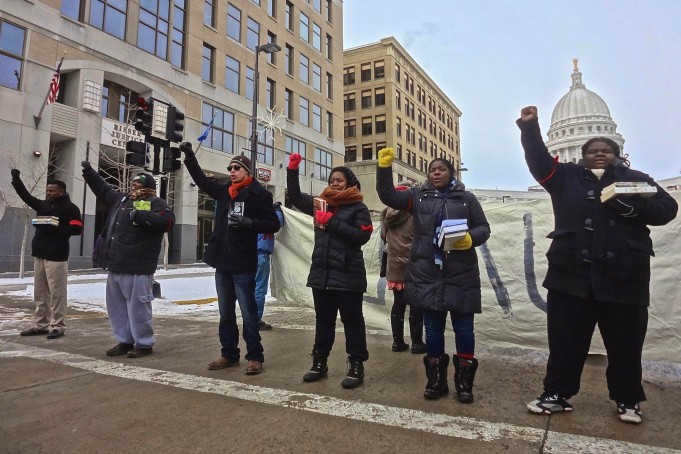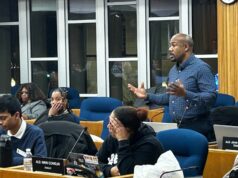“We want to be able to fund good work and there are too many people out here who are doing good work who are not getting supported,” says Eric Upchurch. “And we want to change that.”
The city of Madison has some of the highest numbers of non-profits in the nation and yet they still also have some of the highest racial disparities in the nation. Meanwhile, the funding world has been an obstacle to sustaining radical grassroots social good work. Upchurch and Young Gifted and Black (YGB) are leading the charge to change those disparity numbers by supporting grassroots work through a new “Movement Fund.”
“A big motivation for doing this was realizing that our work should have been funded years ago,” Upchurch tells Madison365. “In a highly competitive funding world, the struggle to prove the case for our survival to funders who don’t share our experience is challenging in one of the nation’s most racially disparate cities, where the solutions we create have to overcome layers of scrutiny and bias that perpetuate the disparities we’re trying to solve.”
Movement Fund supports social justice work and has an emphasis on organizations and initiatives that typically fall outside of the funder favorites but are still all too important to moving communities forward. As an entrepreneur focused on social good, Upchurch, one of the lead organizers for the Young Gifted and Black Coalition and the Chief Visionary at Opportunity Inc., saw that a need needed to be met.

(Photo by Shoana Cachelle)
“I know that there are Black Lives Matter groups across the nation and there are street activist across the globe who just want to house and feed mothers; they just want to clean up the streets,” Upchurch says, “but they are struggling to get funding because they are not fitting into the boxes that the current funding structure of the city has made for us.”
Opportunity Inc. is a strategic development company that activates an advisory board, service providers, and the minds of innovative partners to create success through collaboration. Currently working on 12 in-house projects, they were hitting a little bit of a cash flow problem.
“One of our payment gateways was messed up. There were technical issues. Aside from the 12 social good projects that Opportunity Inc. has, we do consulting work – program design, strategic development,” Upchurch says. “I realized, what my staff already knew, is that a staff of 6 working on 12 projects just isn’t sustainable. What we were struggling with – and what I realized that we were looking for – was a consistent funding base to help keep good things like YGB happening, good things like the Council of Communities or the Madison Alliance for Black Economic Empowerment.”
The idea for Movement Fund came from an answer to a prayer in a dream that Upchurch had. “I was basically shown a set up that would allow people to gain resources by their attempts to provide resources to Opportunity Inc.,” he says.
With the Movement Fund, they created a crowdsourced tool to build funding for low-barrier grants that support social good work that may fall outside of the usually supported criteria. Grants focus on key areas including meeting needs, building awareness, advocacy and action. Movement Fund rewards community partners that help build a network of dedicated monthly contributors who support more grants.
“In our search for the right payment gateway – because our gateway was broken – we came across some technology that allowed us to track referrals and referral donations … and that’s where the seed for the idea came from,” Upchurch says. “We found out that with this technology we’d be able to award people who helped us raise funds. If we just looked at our donor base, that’s enough people to really create sustainable income for ourselves and also add to their own pockets as well.”

The Movement Fund invites any organization – 501(c)(3) or not – to apply
“Pretty much anyone. Our target right now – coming out the gate – is going to be membership-based organizations,” Upchurch says. “We have Downtown Madison Inc. already on the roster – they were our first presentation earlier in January. We want to start with membership-based organizations because it’s a simple ask for them to say, ‘Hey, you remember YGB. This is good work. We want to support the Movement Fund to support that work. Will you join us?’
“Membership gets to feel good about supporting social good work but the organization itself gets to add to its own income stream,” he adds.
In a few short years since its founding, YGB has helped organize many direct actions like freedom schools, education sessions, community conversations, debates, resource workshops and have helped raise funds to meet the needs of black and brown people in Madison and across the United States. Still, YGB has remained at the fringes and without consistent funding because some people have labeled them as “radical,” “dangerous,” or “unfundable.”

(Photo by Z Haukeness)
“We’re realizing that part of the need for Movement Fund was that organizations like YGB – that’s street activism,” Upchurch says. “We’re doing protests, we’re doing community education, and we’re doing freedom schools but we’re also shutting down highways. There’s not a lot of funding for that work. Even if people wanted to fund it, they are shy about it because the people who write their checks don’t agree with the work that they are doing.
“We have to get to a place where our work – especially when it’s related to social justice – isn’t dependent on the belief of people who don’t experience and who don’t understand it,” he adds. “We need to have our resources.”
There are numerous social change agents in Madison and throughout the United States, Upchurch says, who just want to continue making a difference and need a little support to get there; but funders and fundraisers fail to realize a mutual benefit.
“We’ve already been able to grant funds to black mothers to put roofs over their heads and to black entrepreneurs to pay for business expenses that aren’t considered business expenses by the traditional entrepreneur service organizations. Things like food, rent, and childcare,” Upchurch says. “Those are things that entrepreneurs need to pay for if they are going to be successfully focusing on their businesses.
“We’ve seen some success in being able to support those low barrier grants with black entrepreneurs and black mothers and we’re realizing that there is an opportunity for everybody to get behind those unconventional grants for people who just want to do good work,” he adds.
This is not a handout, Upchurch insists, it’s wealth transfer and its an investment in the future of the community.
“If an organization like the Greater Madison Chamber of Commerce decided to be an example to its 1,300 businesses, some of which are some of the largest in the Midwest, and supported something as radical as the Movement Fund … that would be big,” Upchurch says. “It’s not reparations, but it’s definitely a wealth transfer because the funds that are contributed go to social good, people of color-led initiatives. It’s not a handout. The organizations that are spearheading this are actually earning more revenue.”
With the Movement Fund, community partners and volunteers can generate revenues that they can choose to donate back to the fund, or improve their bottom line when they join the movement and share the opportunity to contribute.
“There are so many organizations that won’t hesitate to write a $5,000 check; but that’s a one-time deal,” Upchurch says. “If we can show organizations how they can earn $5,000 extra a month while supporting social good work instead of that one-off thing, we can not only make our own grants more possible, we can start generating more revenue for their social good initiatives, as well.”
The bottom line with the Movement Fund is that initiatives will no longer have to sacrifice impact and core values in order to become palatable to mainstream funders.
“The first goal is that organizations who talk about supporting social good work that they see this as an opportunity to feed two birds with one seed and they take advantage of it,” Upchurch says. “They see it as an opportunity to generate additional income and to support social good work and to make social good work possible.
“The most important goal is that we’re able to actually write some grants that make more work possible here and we’re able to see some success stories that go beyond the black mothers and go beyond the black businesses and see crucial work getting done that otherwise wouldn’t have been funded,” he adds.


































